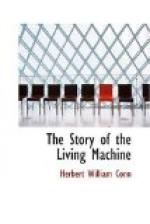Or, again, we may look upon the cell as a little chemical laboratory, where chemical changes are constantly occurring. These changes we do not indeed understand, but they are undoubtedly chemical changes. The result is that some compounds are pulled to pieces and part of the fragments liberated or excreted, while other parts are retained and built into other more complex compounds. The compounds thus manufactured are retained in the cell body, and it grows in bulk. This continues until the cell becomes too big, and then it divides.
If a machine is broken it ceases to carry on its proper duties, and if the parts are badly broken it is ruined. So with the cell. If it is broken by any means, mechanical, thermal, or otherwise, it ceases to run—we say it dies. It has within itself great power of repairing injury, and therefore it does not cease to act until the injury is so great as to be beyond repair. Thus it only stops its motion when the machinery has become so badly injured as to be beyond hope of repair, and hence the cell, after once ceasing its action, can never resume it again.
There are, of course, other functions of living things besides the few simple ones which we have considered. But these are the fundamental ones; and if we can reduce them to an intelligible explanation, we may feel that we have really grasped the essence of life. If we understand how the cell can move and grow and reproduce itself, we may rest assured that the other phenomena of life follow as a natural consequence. If, therefore, we have obtained an understanding of these fundamental vital phenomena, we have accomplished our object of comprehending the life phenomena in our chemical and mechanical laws.
But have we thus reduced these fundamental phenomena to an intelligible explanation? It must be acknowledged that we have not. We have reduced them to the action of chemical forces acting in a machine. But the machine itself is unintelligible. The organic cell is no more intelligible to us than is the body as a whole. The chemical understanding which we thought we had a few years ago in protoplasm has failed us, and nothing has taken its place We have no conception of what may be the primitive life substance. All we can say is that this most marvellous of all natural phenomena occurs only within that peculiar piece of machinery which we call the cell, and that it is the result of the action of physical forces in that machine. How the machine acts, or even the structure of the machine, we are as far from understanding as we were fifty years ago. The solution has retreated before us even faster than we have advanced toward it.




